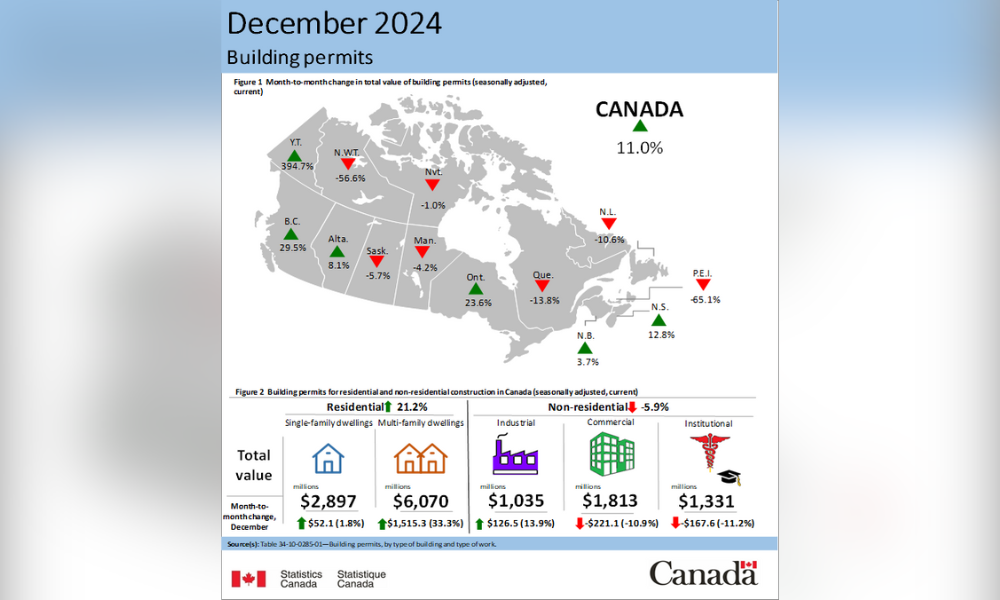Strong demand for multifamily housing led to a surge in permits

Canada’s building permit activity ended 2024 on a high note, with the total value of permits reaching their highest level since 2017.
Statistics Canada reported that building permits in December surged 11% from the previous month to a seasonally adjusted $13.15 billion – a significantly stronger gain than the 1.4% increase economists had predicted, according to TD Securities.
The sharp rise reversed declines seen in October and November and was driven largely by a boom in residential construction permits, particularly in Ontario and British Columbia. On a constant dollar basis, which adjusts for inflation, total building permits were up 8.8% for December and 30.5% year-over-year, underscoring a strong end to 2024.
Building permits serve as an early indicator of future construction activity in Canada, based on data collected from 2,400 municipalities covering 95% of the population. However, the issuance of a permit does not guarantee that construction will begin immediately.
Despite the surge in permits, housing starts dropped 13% in December, falling to an annualized rate of 231,468 units, according to the Canada Mortgage and Housing Corporation (CMHC). Over the year, housing starts were up about 2%, driven by record-high rental construction levels and increased building activity in Alberta, Quebec, and the Atlantic provinces.

CMHC warned that Canada is unlikely to meet the national housing agency’s target for restoring affordability by 2030, even though housing starts are projected to stay above the 10-year average in 2025. The agency also suggested that construction activity may decline further in the coming years, citing a projected slowdown in condominium apartment construction through 2027.
The December increase in building permits was fuelled by a substantial rise in residential construction intentions, which soared to $8.97 billion. The biggest gains came from multifamily dwellings, with permits for these projects rising 33.3% in December, while single-family home permits edged up by 1.8%.
Meanwhile, non-residential building permits fell 5.9% to $4.18 billion, as a decline in commercial and institutional building plans outweighed a modest increase in industrial projects. The drop in non-residential permits was led by Quebec, while Ontario posted an increase in permit values.
Even as permit activity surged, the Canadian construction industry faces potential headwinds in the form of looming tariffs on building materials. A trade dispute between Canada and the United States could escalate, with countermeasures announced by Canada in response to proposed US tariffs on Canadian exports.
Read next: Is another lumber crisis looming?
The tariffs, initially set to take effect in early 2025, were delayed by 30 days after negotiations between President Donald Trump and Prime Minister Justin Trudeau. If implemented, the tariffs could drive up homebuilding costs in both countries, particularly if Canada struggles to find affordable alternatives to US-sourced materials.
In a recent interview with CMP, Canadian Home Builders’ Association (CHBA) CEO Kevin Lee said the industry's outlook will depend on whether Canada can secure cost-effective replacements for key building materials.
CMHC noted that while a full-scale housing market downturn isn’t its base-case scenario, the potential economic impact of tariffs could push housing starts lower than previously forecast.
Make sure to get all the latest news to your inbox on Canada’s mortgage and housing markets by signing up for our free daily newsletter here.



